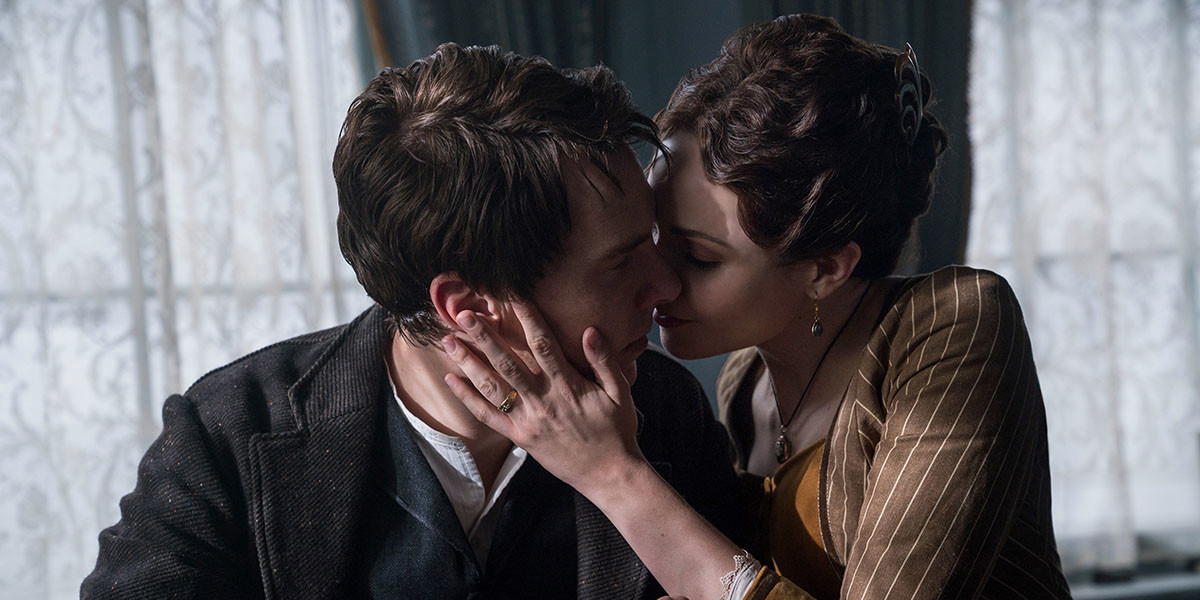[TIFF 2017] REVIEW: ‘The Current War’ buzzes with ideas, but doesn’t connect
Benedict Cumberbatch and Tuppence Middleton as Thomas and Mary Edison in The Current War, directed by Alfonso Gomez-Rejon.
On paper, The Current War has a lot going for it. It features two respected (if not beloved) lead actors, an unexplored historical topic, and the up-and-coming director of one of 2015’s hit indie films. But great components are never the whole story. It’s wiring everything up and throwing the switch that tells you whether you’re going to light up a room, or whether something’s going to catch fire.
Sadly, the latter is true of Alfonso Gomez-Rejon’s new film, which charts the rivalry between Thomas Edison (Benedict Cumberbatch) and George Westinghouse (Michael Shannon) to decide the type of electricity that would become the norm across North America. Gomez-Rejon throws a lot at the screen, especially some adventurous cinematography, but it doesn’t help clarify a thorny narrative that spreads out over many years and offers valid arguments on either side of the debate. No matter the topic, historical period pieces generally need to synthesize the many sources out there into something that educates and entertains inside of two hours. And it’s hard to do that when the director appears to be fussing over the umpteenth long take, off-kilter composition, or daring scene change.
The drama in the story is driven partially by commerce and partially by public service. Edison favours direct current, a low-voltage form of electricity that’s expensive to set up (and only practical for cities) but offers no danger to users who accidentally expose themselves. Meanwhile, Westinghouse is a successful industrialist, and realizes that alternating current is the better option. As long as municipalities can transform a high voltage grid into a lower-power one for individual homes, installation will be cheaper and quicker, even if it means that sticking a fork in an outlet is suddenly a bad idea.
Michael Shannon as George Westinghouse.
Despite Edison’s renown as a great American inventor, towns and cities decide with their budgets, and the tide turns in Westinghouse’s favour. Desperate to preserve what he believes is a superior technology, Edison resorts to mudslinging and late 19th-century fake news tactics to smear Westinghouse. Edison exploits the development of the electric chair as an execution tool in American prisons to convince the public that Westinghouse’s current is lethal. Westinghouse must figure out how to out-manoeuvre the effect of Edison’s fame and dirty tactics, as he chases a nobler goal to improve the lives of an entire society.
For a film with “war” in the title, the hostilities certainly take their time getting started. It feels like Westinghouse and Edison don’t really set their minds against each other until the 30-minute mark, and once they are in competition, the movie dances around telling us who to support. We can’t be sure whether to cheer on the sensible (if boring) Westinghouse, or the temperamental genius, Edison. History may suggest that both men found valid flaws in each other’s systems, but that doesn’t mean the filmmakers have to be quite so ambivalent.
Gomez-Rejon’s framings get more than a little distracting at points, particularly in the opening act, which features a series of roving, gimbal-stabilized long takes. But rather than employ these hovering shots to communicate something about the characters inside them, the director seems to be abdicating his responsibility to tell the audience where to look. It’s not unlike moviemaking with 360-degree cameras: by putting the tool front and centre, we’re given too much latitude and our attention drifts elsewhere. More baffling still is that the director abandons this technique as the movie continues, preferring instead to over-edit his material – cutting away from scenes before a satisfying rhythm can build.
Flitting in and out of the story are other historical notables, including financier J.P. Morgan (Matthew Macfadyen) and the man who many history buffs would much prefer to see in his own biopic, Nikola Tesla (Nicholas Hoult). In fact, Tesla’s role in the battle battle alternating and direct current (as he shifts allegiances from Edison to Westinghouse) is instrumental enough that his rare appearances only tease us with a more sharply defined film happening in the background. To his credit, however, Gomez-Rejon and his screenwriter Michael Mitnick find more for the main characters’ wives to do than wait at home. Both women – Katherine Waterston as Marguerite Westinghouse and Tuppence Middleton as Mary Edison – are shown to be important parts of their husbands’ decision-making.
The Current War also wrestles with getting a distinguishable performance from Cumberbatch. As much as I like his work normally, the star seems stuck in a combo of the irritability of his Sherlock interpretation and his default American accent from Doctor Strange. Mitnick’s script is missing the fiery poetry that makes Cumberbatch’s Holmes so captivating, meaning his Edison isn’t nearly as charismatic as the film patiently explains to us.
Some flexibility is due to Gomez-Rejon, understanding that the print he brought to TIFF 2017 wasn’t 100% complete (he explained during an audience Q&A that some CG shots still needed work). But without some major structural changes, it’s doubtful that a huge improvement could be made on the film before its final release. Maybe Gomez-Rejon could learn something from Westinghouse’s example: sometimes it’s the practical stuff can have the biggest impact.
The Current War gets two stars out of four.
Stray thoughts
There’s a Marvel-style cinematic universe waiting to be made about American inventors – maybe that’s how a Tesla solo movie will finally happen?
Seeing Cumberbatch play another role like Edison further proves that he’s an actor in desperate need of a true comedy role (Zoolander 2 doesn’t count)



